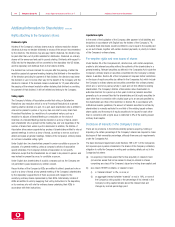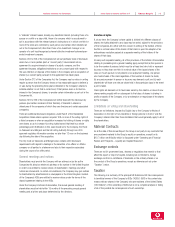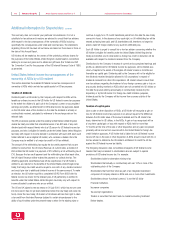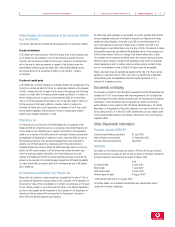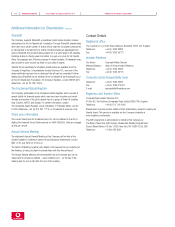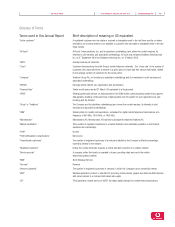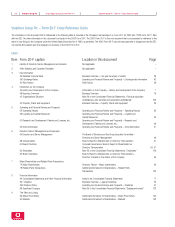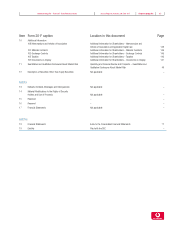Vodafone 2002 Annual Report Download - page 147
Download and view the complete annual report
Please find page 147 of the 2002 Vodafone annual report below. You can navigate through the pages in the report by either clicking on the pages listed below, or by using the keyword search tool below to find specific information within the annual report.
Additional Information for Shareholders Vodafone Group Plc 145Annual Report & Accounts and Form 20-F
A “material”interest means, broadly, any beneficial interest (including those of a
spouse or a child or a step-child, those of a company which is accustomed to
act in accordance with the relevant person’s instructions or in which one third or
more of the votes are controlled by such person and certain other interests set
out in the Companies Act) other than those of an investment manager or an
operator of a unit trust/recognised scheme/collective investment scheme/open-
ended investment company.
Sections 204 to 206 of the Companies Act set out particular rules of disclosure
where two or more parties (each a “concert party”) have entered into an
agreement to acquire interests in shares of a public company, and the
agreement imposes obligations/restrictions on any concert party with respect to
the use, retention or disposal of the shares in the company and an acquisition of
shares by a concert party pursuant to the agreement has taken place.
Under Section 212 of the Companies Act, the Company may by notice in writing
require a person that the Company knows or has reasonable cause to believe is
or was during the preceding three years interested in the Company’s shares to
indicate whether or not that is correct and, if that person does or did hold an
interest in the Company’s shares, to provide certain information as set out in the
Companies Act.
Sections 324 to 329 of the Companies Act further deal with the disclosure by
persons (and certain members of their families) of interests in shares or
debentures of the companies of which they are directors and certain associated
companies.
There are additional disclosure obligations under Rule 3 of the Substantial
Acquisitions Rules where a person acquires 15% or more of the voting rights of
a listed company or when an acquisition increases his holding of shares or rights
over shares so as to increase his voting rights beyond that level by a whole
percentage point. Notification in this case should be to the Company, the Panel
on Takeovers and Mergers and the UK Listing Authority through one of its
approved regulatory information services no later than 12 noon on the business
day following the date of the acquisition.
The City Code on Takeovers and Mergers also contains strict disclosure
requirements with regard to dealings in the securities of an offeror or offeree
company on all parties to a takeover and also to their respective associates
during the course of an offer period.
General meetings and notices
Shareholders must provide the Company with an address or (so far as the
Companies Act allow) an electronic address or fax number in the United Kingdom
in order to be entitled to receive notices of shareholders’ meetings and other
notices and documents. In certain circumstances, the Company may give notices
to shareholders by advertisement in newspapers in the United Kingdom. Holders
of the Company’s ADSs are entitled to receive notices under the terms of the
deposit agreement relating to the ADSs.
Under the Company’s Articles of Association, the annual general meeting of
shareholders must be held within 15 months of the preceding annual general
meeting and at a time and place determined by the directors.
Variation of rights
If, at any time, the Company’s share capital is divided into different classes of
shares, the rights attached to any class may be varied, subject to the provisions
of the Companies Act, either with the consent in writing of the holders of three
fourths in nominal value of the shares of that class or upon the adoption of an
extraordinary resolution passed at a separate meeting of the holders of the
shares of that class.
At every such separate meeting, all of the provisions of the Articles of Association
relating to proceedings at a general meeting apply, except that (a) the quorum is
to be the number of persons (which must be at least two) who hold or represent
by proxy not less than one-third in nominal value of the issued shares of the
class or, if such quorum is not present on an adjourned meeting, one person
who holds shares of the class regardless of the number of shares he holds,
(b) any person present in person or by proxy may demand a poll, and (c) each
shareholder will have one vote per share held in that particular class in the event
a poll is taken.
Class rights are deemed not to have been varied by the creation or issue of new
shares ranking equally with or subsequent to that class of shares in sharing in
profits or assets of the Company, or by a redemption or repurchase of the shares
by the Company.
Limitations on voting and shareholding
There are no limitations imposed by English law or the Company’s Articles of
Association on the right of non-residents or foreign persons to hold or vote the
Company’s shares other than those limitations that would generally apply to all of
the shareholders.
Material Contracts
As at the date of this Annual Report, the Group is not party to any contracts that
are considered material to the Group’s results or operations, except for its
$13.7 billion credit facility which is discussed under “Operating and Financial
Review and Prospects – Liquidity and Capital Resources”.
Exchange controls
There are no UK government laws, decrees or regulations that restrict or that
affect the export or import of capital, including but not limited to, foreign
exchange controls on remittance of dividends on the ordinary shares or on
the conduct of the Group’s operations, except as otherwise set out under
“Taxation”, below.
Taxation
The following is a summary of the principal US federal and UK tax consequences
to beneficial owners of the Company’s ADSs (“ADSs”) (ADS in this context also
means ordinary shares in the Company) who are residents of the United States
(“US Holders”) of the ownership of ADSs but is not a complete analysis or listing
of all of the possible tax consequences of such ownership.











